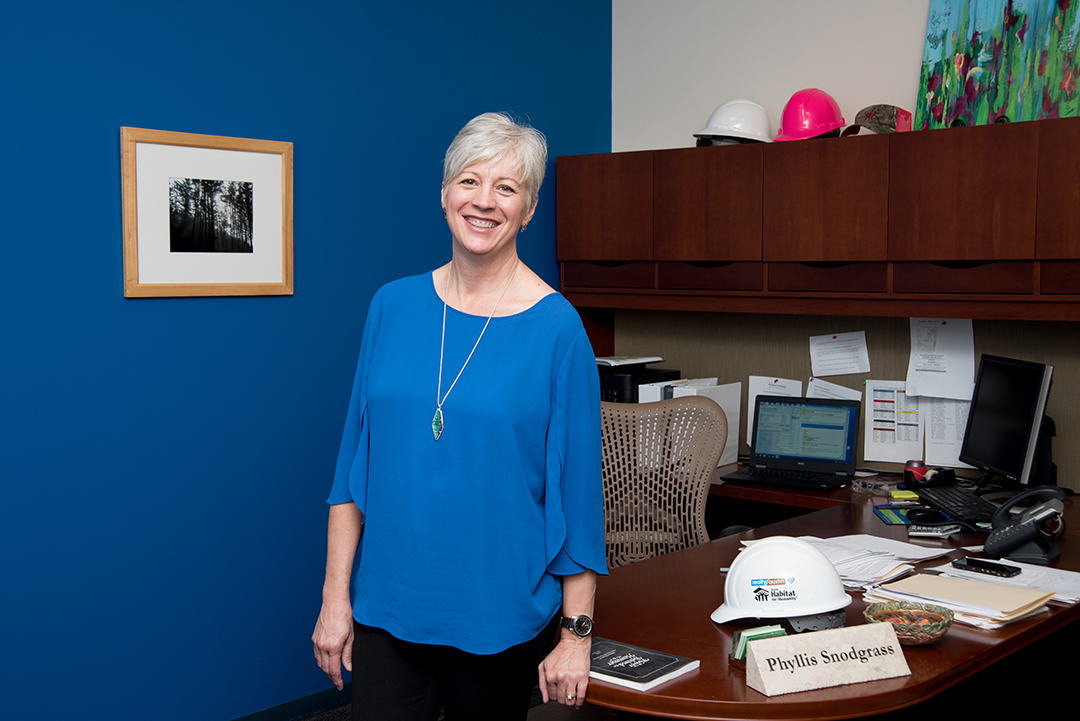The CEO of Austin Habitat for Humanity shares her insight on what makes a house a home.
By Abigail Rosenthal, Photo by Kevin Garner
 After 18 years running multiple chambers of commerce throughout Texas, Phyllis Snodgrass felt she wanted to try something different. She knew by utilizing her experience in community development and the connections she had made throughout Austin, she could benefit Austin Habitat for Humanity as its CEO. Since she took on the position in November 2015, her days have included meeting with developers, conversing with community groups and speaking with potential supporters of Austin Habitat for Humanity and its resale store, ReStore.
After 18 years running multiple chambers of commerce throughout Texas, Phyllis Snodgrass felt she wanted to try something different. She knew by utilizing her experience in community development and the connections she had made throughout Austin, she could benefit Austin Habitat for Humanity as its CEO. Since she took on the position in November 2015, her days have included meeting with developers, conversing with community groups and speaking with potential supporters of Austin Habitat for Humanity and its resale store, ReStore.
During the course of the last 30 years, Austin Habitat for Humanity has provided more than 420 homes through its main outreach program. Before entering their new homes, partner families must pay a down payment, put in 300 hours of sweat equity building homes for neighbors and themselves, and take homebuyer-education courses.
“We feel like when we turn over the keys to that home, it really changes the lives of the people from that point forward because they’re able to make decisions about their future and start saving and be a part of their community,” Snodgrass says.
As someone working to help families build homes of their own, Snodgrass defines the principles that help turn a house into a home.
Her List
- Being able to host friends and family. “For a lot of these kids, this is the first time they’ve really felt comfortable bringing people over. Now they’re going to have a place where they can invite their friends over and bring them home.”
- Getting to make a home your own. “When you own a home, you get to make personal touches. It’s a place you can make your own in a way you can’t do with something you don’t own.”
- Food smells. “When we celebrate a new home with a family, we always celebrate it with a dedication and the families do the cooking. The families come from so many different backgrounds, and they’re always doing this wonderful cooking and just the smell of the food and the meals … [getting]shared in that home continue.”
- The ability to get involved in the community. “Because you’ve put down roots, you start to have a real stake in that community. You’re going to live there a long time and the decisions that get made there matter to you. It’s difficult [to do that]when you’re spending time looking for that next place to live. To be able to stay in that community, it makes such a difference.”
- The people in the home and the memories made. “When you own that home, the longer you stay anywhere, the more memories you have and the more attached you become to that location. There’s going to be so many snapshot moments and wonderful things that are going to happen in that home. When you look at the smudge on the wall or the BB bullet that made it through the window, those are just the things that, to me, really make a house a home.”

